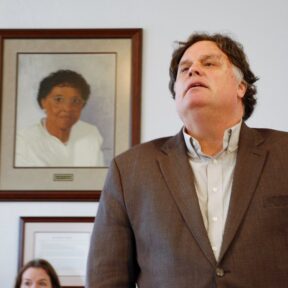
Gene Nichol
: Photo from Creative Commons / Author of Photo: NC Justice CenterOverview
* Dean of the University of North Carolina Law School from 1999-2005
* President of the College of William & Mary (W&M) from 2005-2008
* Wealthy anti-capitalist who advocates wholesale wealth redistribution
* Supports race-based affirmative action
* Opposes Voter ID laws
* Has lost both of his runs for Congress
Gene Nichol was born on May 11, 1951 in Dallas, Texas. After earning a bachelor’s degree in philosophy from Oklahoma State University (1973) and a J.D. from the University of Texas (1976), he taught legal studies in the undergraduate and law schools of Colorado, Exeter, Florida, Oxford, and West Virginia Universities. Moreover, Nichol served as director of the William & Mary Bill of Rights Institute (1985-88); law dean at the University of Colorado (1988-95); dean of the University of North Carolina (UNC) Law School (1999-2005); and president of the College of William & Mary (W&M) from 2005-08.
In October 2006, Nichol sparked controversy when he decided to remove a century-old cross from W&M’s 274-year-old Wren Chapel, a facility that was sometimes used for secular campus events, so as to avoid making people of other faiths feel “less welcome” therein. Nichol decreed that the cross should only be placed on the chapel’s altar when Christian services were being held. In response to considerable public outcry against his directive, Nichol established a presidential committee to explore the issue. In March 2007 the committee recommended that the cross be returned to the Wren Chapel as an artifact displayed inside a glass case, with a plaque explaining the College’s Anglican heritage. Nichol agreed to this compromise.
Eleven months later, Nichol again was widely citicized for agreeing to allow a “Sex Workers’ Art Show” to proceed on the W&M campus. Emphasizing that “censorship has no place at a great university,” he characterized his decision as a defense of the First Amendment. After subsequently learning that W&M’s Board of Visitors had decided not to renew his three-year contract—which was slated to expire on June 30, 2008—Nichol resigned from his presidential post on February 12 of that year.
Several weeks later Nichol returned to the UNC School of Law, where, ever since, he has been the Boyd Tinsley distinguished professor of law as well as director of the campus’s Center on Poverty, Work and Opportunity. In the latter position, Nichol succeeded the former U.S. senator and disgraced vice presidential candidate John Edwards.
Condemning the “stark inequality” pervading American society, Nichol routinely disparages the U.S. for its allegedly egregious failure to uphold both the Declaration of Independence’s affirmation that all men are “created equal,” and the Constitution’s promise of “equal protection of the laws.” Specifically, he cites the “astonishing” fact that “in the richest nation on earth, over 15 percent of us fall below the stingy federal poverty standard”; that there are currently “more poor people in poverty, in raw numbers, than at any moment in our long history”; and that America has “the most daunting income differentials—gaps between rich and poor”—of any nation on earth. Complaining, further, that “our poverty is skewed sharply by race,” Nichol cites the disproportionately high poverty rates of “African-Americans, Latinos and Native Americans” as proof of the nation’s intransigent racism.
“Yawning chasms of inequality and the advanced world’s highest levels of poverty are central to America’s particular economic genius,” Nichol elaborated in February 2014. “Only as a result of our unfettered, rapacious, investor-subsidized version of capitalism can such astonishing mountains of wealth be produced” amid pockets of squalor.
While Nichol strongly advocates wholesale wealth redistribution as a means of addressing income inequality, his own financial assets dwarf those of most Americans. Indeed, Nichol receives a professor’s salary of more than $200,000 per year while his wife earns over $407,000 annually as chief of staff for the UNC Health Care System and the UNC School of Medicine. Residing in a Chapel Hill home valued at more than $1 million, the couple also owns an Emerald Island beach bungalow worth at least $500,000. During the summer months, they rent out their four-bedroom retreat for nearly $2,000 per week.
As yet another means of reducing inequality, Nichol supports the use of “racial affirmative action” in college and university admissions. Warning that the abandonment of this practice will lead to “a potent resulting segregation,” he contends that race preferences are justified in light of the fact that “racial transgression has been the largest sin of American life, from our first day to this.”
Nichol also detects racism in various state-based efforts to pass voter ID laws, which he depicts as “purposeless … restraints that happen to favor a powerful, white majority.” He maintains that by “restricting the franchise”—i.e., the voting rights of nonwhite minorities—these statutes constitute “a frontal assault on both our history and our theory of government.” Such “sins against democracy,” says Nichol, “are not to be forgiven.”
Nichol asserts that racial inequity likewise pervades the American criminal-justice system, which “now has the highest rate of incarceration in the world—outpacing even harsh regimes like Iran, China and Russia.” Noting that U.S. “incarceration rates are … dramatically skewed by race,” he laments that “we imprison higher percentages of black men than South Africa did during apartheid.” This is evidence, Nichol reasons, that America’s courts and prisons are being used to bring about a “New Jim Crow.” “The results flowing from expansive incarceration are devastating,” Nichol expounds. “Felons are frequently tagged for life—effectively barred from employment, housing, public benefits, access to educational opportunity and even food stamps.”
In addition to his academic pursuits, Nichol has twice attempted to enter the world of politics. In 1996 he made a bid for the U.S. Senate representing the state of Colorado, but was defeated in the Democratic primary. On another occasion he ran for a U.S. House of Representatives seat but was again defeated.
For additional information on Gene Nichol, click here.